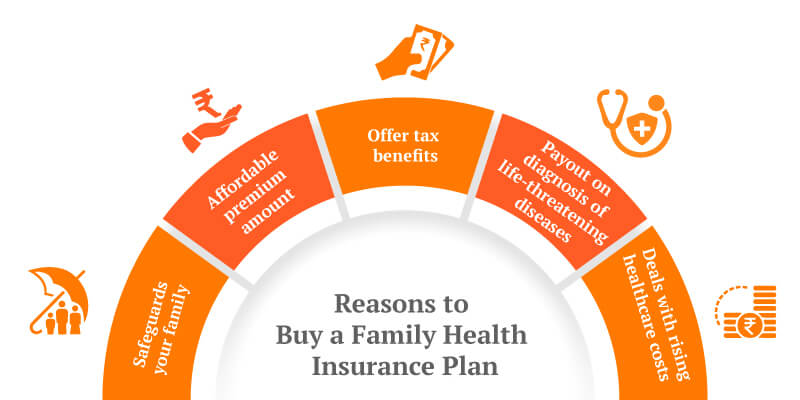Medical emergencies are one of the many unknown facets of life. It is crucial to protect your family from the financial hardships that can result from sudden medical cases. Purchasing health insurance plans for family is one way to go about it. However, with so many alternatives, it might be difficult to choose an insurance plan that will be ideal for you. The following list of 10 factors will help you choose the best health insurance package for you and your family:
- Age Factor
When it comes to choosing a health insurance plan, age is a determinant. The age of the relatives who are to be insured should be taken into account when buying medical insurance. The rate of the premium, much like in a family floater insurance, would be based on the age of the oldest family member.
When purchasing medical insurance, you should also look into the age restriction criteria. For instance, some health plans have entry-age requirements that range from 91 days to 60 years, with 91 days being the least and 60 years being the maximum. Other health insurance plans for family include age restrictions ranging from 25 years old at the youngest to 50 years old at the oldest. You can also find some policies that do not impose any limitations on entering age.
- Cashless Benefits
Generally, health insurance providers partner with network hospitals so that insured individuals can receive cashless care in the event of a medical emergency. This will prevent you from completing the tiresome documentation necessary for admission and claim. Additionally, the insurance company pays the hospital directly with the insured amount.
Therefore, you are not required to first secure funding before requesting reimbursement. It will be beneficial if you ask your insurers for a list of accredited hospitals to be aware of all the network hospitals in the area.
- Balance Between Premium And Coverage
Health insurance plans for family that have a lower premium and offer you comprehensive coverage at a price you can afford may be a suitable choice. However, you might have to compromise with the coverage and benefits of the plan owing to less premium. Therefore, the best course of action is to investigate the causes of a lower premium, as it should not be at the expense of insurance coverage. Look for any additional co-payment, deduction, and sub-limit provisions. These clauses might make you pay more during claims.
- Maternity Coverage
Many people make the error of skipping maternity benefits in health insurance plans for family. It is best to choose a health plan that includes maternity costs, given the sky-high cost of delivery and maternity care. Typically, there is a 2 to a 4-year waiting time before you can apply for benefits. For instance, a plan with a two-year waiting period will work for you if you intend to get married or start a family in no less than three years. Select a plan that covers delivery costs as well as newborn baby medical costs. Consider restrictions that come with the clause as well.
- Waiting Period
Making a decision would be easier if you are acquainted with the waiting time provision. During this time, the insurer will not accept any claims resulting from pre-existing disorders or certain illnesses. Depending on the insurer and the medical insurance plan you have selected, it can be anywhere between 2 to 4 years. Additionally, you won’t be able to submit a claim for benefits until this time has passed.
Any pre-existing conditions that a person may have before purchasing the insurance will be subject to this waiting time, including thyroid, blood pressure, diabetes, etc. Furthermore, it can be used for a variety of specialised medical conditions and treatments, including those for cataracts, varicose veins, and arthritis. As a result, you can evaluate plans and select one that has a short waiting period.
- No-Claim Discount/Bonus
When we talk about NCB (No-Claim Bonus), we are talking about the reduction that the insurer provides for each year that you go without making a claim. Essentially, for every year without a claim, your coverage amount is enhanced at the time of following policy renewals. However, the majority of health insurance plans for family outline the NCB cap. Furthermore, the growth in the insured amount would be subject to the insurer-specified limit.
- Pre and Post-Hospitalisation Charges
A large percentage of medical insurance policies pay for only the medical costs linked to hospitalisation. Purchase a plan that includes coverage for costs incurred both before and after the hospital stay to reduce costs associated with paramedic fees, diagnostic exams, medications, doctor appointments, etc.
- Co-Payment
This phrase is often misunderstood and disregarded when individuals buy health insurance plans for family. This is essentially a portion of the amount that you would have to pay at the time of a claim while the insurer covers the remaining sum. Therefore, before you sign your medical insurance policy, make sure there are no co-payment provisions to reduce the amount of your claim. If possible, purchase a plan without sub-limits. However, a majority of insurers have a co-payment provision if you have any pre-existing medical conditions or have reached a certain age.
While having health insurance plans for family will not ensure a swift recovery, it will certainly save you from having to pay for exorbitant and unnecessary medical care. In light of this, if you and your family still do not have health insurance, it is time to start exploring medical insurance plans while keeping these factors in mind.


